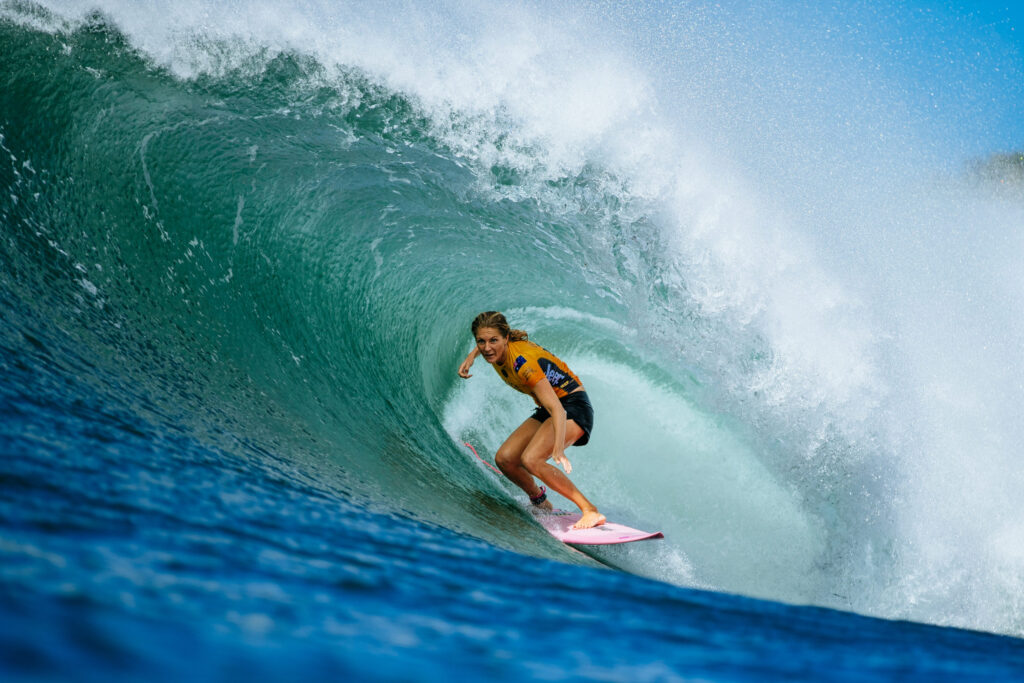An Olympic gold medal is always a big deal, but some are the culmination of extra special journeys.
The gold medal quests of Cat Osterman, Stephanie Gilmore, and Dawn Staley are three such cases. The best pitcher of all-time is coming out of retirement for Olympic redemption. A seven-time world surf champion will have a chance to win the first ever gold medal in her sport. And for the very first time, a Black woman will serve as the head coach of the USA Women’s Basketball team.
The six grams of gold plating on pure silver might be the physical constitution of a gold medal. But it’s the unique story of human pursuit of excellence that we truly value. And these are three of the best stories heading into Tokyo.
Cat Osterman, Softball
Cat Osterman has a solid claim to being the greatest softball pitcher of all time. She won a gold medal as the youngest player on Team USA in 2004, leading the team in strikeouts. She graduated from The University of Texas in 2006 as a three-time National Player of the Year, four-time All-American, and two-time ESPY Award winner. She still holds the NCAA record for highest career strike-out-per-seven-inning ratio at 14.34, as well as UT records for total victories, ERA, shut-outs, and no-hitters.
When she retired from the National Pro Fastpitch league in 2015, she was a three-time Pitcher of the Year, four-time champion, and six-time All-NPF Team selection. Last summer, playing in the inaugural Athletes Unlimited softball season, Osterman won the league’s individual title after accumulating the most player points over the course of the season.
Osterman officially retired once from softball — in 2015. She was back on the mound for Athletes Unlimited because the southpaw pitcher has some serious unfinished Olympic business to attend to.
Ahead of the 2008 Olympics in Beijing, the IOC announced it would be removing baseball and softball from the Olympics after Beijing. Osterman was gutted. She was by far the best up-and-coming softball pitcher in the country, if not the world. Her counterpart on the baseball side likely had a decade-long, multimillion-dollar MLB career to look forward to, but Olympic glory once every four years was the highest stage Osterman could hope to play on.
In the gold medal match in Beijing, Osterman came out after five innings with the U.S. trailing 2-1. Twice, the U.S. couldn’t capitalize on a one-out, bases loaded opportunity, and a wild throw home allowed Japan to score a third run in the top of the seventh. The U.S. went scoreless to finish the inning and Japan erupted into the exuberant elation of having won Olympic gold while handing the U.S. their first Olympic loss in eight years and their first non-gold medal in Olympic softball since 1996.
For Osterman, it was the only two runs and only loss she’d allowed on the Olympic stage. The salt in the wound was knowing there would be no chance for redemption.
But when she found out a decade later that softball would be reinstated for 2020, Osterman shook off the dust, got back on the mound, and quickly proved that even in her late 30s, even as the oldest player on the roster for Tokyo, she is still one of the very best. Thirteen years later, we now have the chance to watch the sport’s greatest pitcher complete a 13-year redemption story.
Stephanie Gilmore, Surfing
In 2007, at 19 years of age, Stephanie Gilmore won surfing’s World Title in her debut season on the World Surfing League tour. No man or woman had ever won the championship in their rookie season, and Gilmore went on to add three more consecutive World Titles, making it four in a row for the young superstar.
Over the last decade, she has added three more to her trophy case, tying her with legend Layne Beachley for the most women’s World Titles in history.
When speaking to Kelley O’Hara on the Just Women’s Sport podcast last winter, she said the most rewarding title of her career was the fifth, which she won in 2012. The reason? It was the first title she won after being physically assaulted by a stranger outside her home.
Gilmore had been walking back to her apartment after plans to see a movie with a friend fell through. As she approached the stairs to her building, a stranger ran up behind her and hit her twice with a metal bar. The first blow was to her head, and she immediately saw blood everywhere. The second broke the wrist of the arm she had raised to shield herself.
While the physical injuries healed quickly, the emotional trauma was much harder to recover from, and her performance showed it when she finished 11th in 2011. After spending the first years of her career known on tour as “Happy Gilmore,” she had to discover a grittier, angrier drive to win after her confidence was so deeply rattled. Once she tapped into this more primal, competitive instinct, she got back to winning and earned her fifth and most hard-fought championship in 2012.

Now heading into Tokyo to compete in surfing’s Olympic debut, that fighter mentality will serve her well. Countries are limited to sending two men and two women to compete in Tokyo, but Australia currently has five surfers ranked in the top ten on the women’s side. The unavoidable shuffle in rankings since qualification ended in 2019 has led some critics to question whether she deserves the spot. Winning surfing’s inaugural gold medal this summer would not only add a historic achievement to a hall of fame career, it would also silence the doubters like nothing else could.
Dawn Staley, Basketball
Dawn Staley has been head coach of the USA Basketball Women’s National Team since 2018, when she led the squad on an undefeated path to the gold medal at the 2018 FIBA World Cup, qualifying for Tokyo 2020. But her winning record with USA Basketball isn’t the most useful barometer of what she brings to the table, given the team has a 114-3 record at the World Cup and Olympic-level since 1990.
The absolute domination of the U.S. women in international basketball is something we’ve come to lazily expect while offering little congrats in return. But Staley is still in a league of her own. She’s the first person to ever be both USA Basketball’s Player of the Year (1994, 2000) and Coach of the Year (2018). Scrolling further down her resume are two Naismith College Player of the Year Awards, six WNBA All-Star Awards, AP National Coach of the Year (2020), Naismith Coach of the Year (2020), and an NCAA DI Championship with her South Caroline Gamecocks in 2017.

Simply put, Dawn Staley is a boss. But championships and accolades aside, Staley’s tenure at the helm of this team holds deeper significance: she is the first Black person to hold this role, and it’s not something she takes lightly.
“Nowadays, we’re hearing a lot of ‘firsts,’” she told Gamecocks Online. “Whether it’s two black coaches at a NCAA Final Four, or two black coaches competing at a SEC Championship. Now, a black coach being the head coach of an Olympic team. I know some people are like, if you can coach, you can coach. That’s true, but when it’s a first, and when it’s history-making, I think it’s something to be proud of. It also allows other doors to be opened and opportunities for black coaches to hold these positions.”
For Staley, the importance lies in what her identity signifies to her athletes. About 50% of all NCAA Division I women’s basketball student-athletes are Black (which has been the case for at least a decade). On the professional level, about 70% of WNBA players are Black.
“There just weren’t a lot of options for me to play for someone who looked like me. Who fundamentally understood me,” she wrote in The Players Tribune in 2018. “I do think young black women have to understand how to navigate through life as a black woman. A lot of the girls playing basketball now — their paths to success are probably similar to mine.”
If Coach Staley can lead Team USA to their seventh Olympics title in a row in Tokyo, the impact her visibility could have on the next generation could be worth more than any gold medal.

